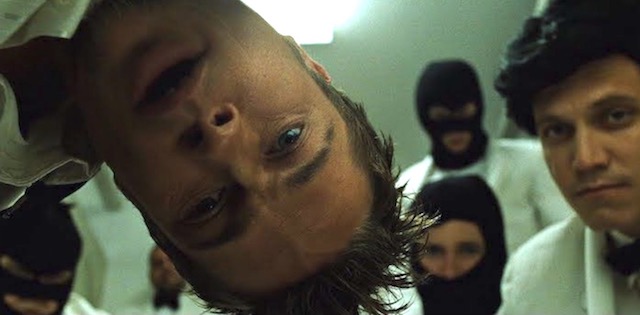“I see in Fight Club the strongest and smartest men that have ever lived,” said Tyler, stoically roaming through the beaten and bloody clusters of men.
“I see all of this potential, and I see squandering. Goddammit, an entire generation pumping gas, waiting tables—slaves with white collars. Advertising has us chasing cars and clothes, working jobs that we hate so that we can buy sh*t we don’t need.”
His words emanate sheer power and vigor. I am magnetized.
“We’re the middle children of history, man. No purpose or place. We have no great war. No great depression. Our great war’s a spiritual war. Our great depression is our lives. We’ve all been raised to believe that one day we’ll all be millionaires, movie gods, and rock stars. But we won’t. And we are slowly learning that fact. And we’re very, very pissed off.”
This how I met Tyler Durden.
I came upon the cinematic and literary masterpiece that is the “Fight Club” franchise when I was about 16 or so, and the timing couldn’t have been more perfect.
I had actually been staying up all night after a drug-induced bender, full of self-loathing and confusion, and I turned on the television to find a screening of “Fight Club” airing on AMC about midway through.
I had vaguely heard of it, but assumed it was just another one of Hollywood’s ill-fated attempts to depict actual fighting with a dash of narrative and a pinch of romance. The truth couldn’t have been further from my thoughts.
“Fight Club” is perhaps the foremost existential showcase of my generation, both in film and in literature (the whole book versus movie thing isn’t relevant to me because they are both so damn good). It depicts a nameless and dejected protagonist who finds himself lost in a world of consumerism and corporate supremacy.
The values of the common man are transfigured into corporate values, as is portrayed through the character’s obsession with IKEA catalogs and the collecting of useless possessions (which he refers to as the IKEA nesting instinct), all of this while he unknowingly delves into a deeper state of chaos and insanity within his own psyche.
The film struck me at the time because of how lost I felt, how disillusioned I had become with consumer culture, and how disheartened I felt in regards to my path in life. The “American Dream” had truly died to me. I felt like there was no “right” way to be, that all of human life was pure disorder and madness, and in that there is very little room for self-empowerment and personal evolution.
It was a kind of nihilistic phase for me. I was realizing that there is no such thing as adulthood really, that everybody is just kind of pretending that they know what they’re doing, and the natural response seemed to be to allow myself to be taken in by the stark absurdity of it all, leading to drugs, miscellaneous sexual excursions, fights, and all other sorts of tomfoolery.
Now, the essence of “Fight Club” is by no means a nihilistic or spiteful sentiment; rather, it is that of acknowledging the utter chaos of human life and attaining some kind of order within ourselves.
As it is with the protagonist (I am Jack’s broken heart), there needed to be a phase of sheer chaos before any kind of meaning could be uncovered. This is what Tyler Durden represents—the unconscious, the shadow side, the chaos that rests beneath our shallow notions of order, the madness that sits quietly (or not so quietly) beneath the edifice of culture.
“Fight Club” is really a story about depth psychology in the sense that it is only through giving credence to our unconscious proclivities that we might come to harness and transcend them, and from there, perhaps we might come to live in such a way that makes human suffering worth contending with.
We all have a Tyler Durden resting within us, an underlying agent of chaos that must be understood and contained if we are to move through the world powerfully and with tremendous dignity. If Tyler isn’t attended to, then he will manifest through us in various harmful and insidious ways.
It is also important to recognize the allure of our shadow side, as to why Tyler is so attractive and intriguing in the film. There is a certain pull to the unknown, the chaotic, the disorderly, and it is incredibly valuable to understand this propensity of ours.
It is not about choosing order over chaos, or vice versa as displayed in the movie; it’s about cultivating a quality of balance between the two, understanding that we are comprised of both order and chaos, and doing our best to attain a sense of inner alignment amidst the flux of these two most inherent energy fields.
We must create our own values. We must sink into our shadow side, meet our own Tyler Durden, and uncover whatever knowledge lies beneath the delicate structure of our own ego. Meaning cannot be attained by looking outward; rather, we must come to understand the fabric of our own nature. As it is within, so it goes without.
So, we don’t necessarily need to blow up any buildings or start a local fight club to bring about a sense of happiness; rather, we need only come to face the archetypal Tyler Durden that exists within the depths of our own consciousness and greet him with a smile.
~
~
~
Author: Samuel Kronen
Image: “Fight Club”
Editor: Travis May











Read 0 comments and reply